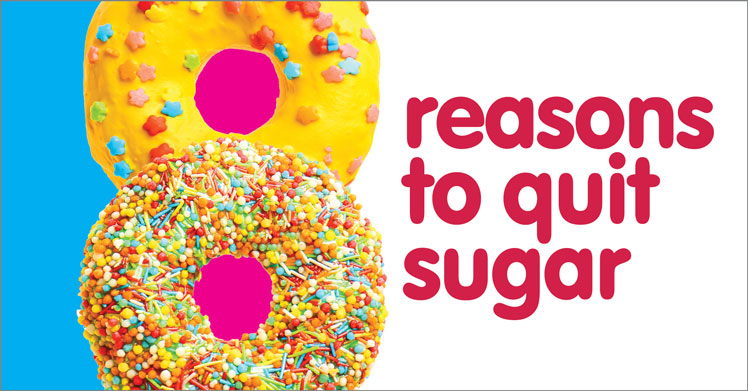These are some of the recent headlines about sugar…
“Removing sugar from diet for just nine days can have ‘dramatic results’, new study claims.” Independent
“Sugar is as dangerous as alcohol and tobacco, warn health experts.” The Telegraph
“Sugar is addictive, warns top doctor.” The Times
Sugar seems to have replaced fat as the number one food to avoid due to it’s numerous adverse health effects. Have you ever thought about quitting, or at least considerably reducing your sugar intake? To be clear, I’m not talking about natural sugars present in unprocessed fruits and vegetables as these are bound together with fibre, vitamins and minerals, all of which have numerous benefits. I’m talking about free sugar, which is sugar that has been added, and is found in processed food such as sweets, chocolate, ready meals, savoury fast food, reduced fat foods and many dressings and sauces.
So, let’s set the scene and look at what happens in our body when we eat sugar.
The key thing here is how much and the type of sugar we eat, and how fast it gets from our stomach and into our bloodstream. All carbohydrates are made up of glucose and eventually get broken down into glucose in our body, whether it’s a slice of cake or a roast potato. If the carbohydrate or sugar is bound with fibre, fat and/or protein (as with fruits and vegetables) then its absorption is slower and we therefore avoid that sugar peak and have a nice slow release of sugar. Consuming a soft drink on an empty stomach for example, is possibly one of the worst things you can do as there is little in the soft drink (or your stomach) that will slow down the absorption of sugar, and the glucose will get into the bloodstream very fast causing a rapid spike in blood sugar and insulin release.
“Imagine insulin like a bus, it transports the sugar from the blood stream to the cells or if not needed, it gets packed away as fat”
Because excess sugar in the blood is so bad for our cellular health, the body is extremely strict about how much sugar it allows to be in the blood at any one time. Insulin is the key hormone in the body that deals with the distribution of this sugar. Imagine it like a sugar bus, it transports the sugar from the blood stream either to the cells for energy generation, or if not needed there, it gets packed away as fat. Yes fat. In a nutshell, sugar intake stimulates insulin release, and insulin stimulates the body to store fat. So if you want to control your weight, a key aspect is controlling your blood sugar and keeping your insulin levels to a minimum.
For better all-round health it is important to avoid these peaks in our blood sugar and keep our insulin working efficiently by not overworking it. Too many of these peaks can cause the insulin sugar bus to become worn out and less able to shuttle the sugar into our cells for energy, leading to raised levels of insulin and sugar in the blood. This is called insulin resistance and in the early stages is associated with weight gain and fatigue. Longer term it is well associated with many health problems such as Type 2 diabetes, heart disease, cancer, metabolic syndrome, polycystic ovarian syndrome (PCOS) and non-alcoholic fatty liver disease.
So, here are eight great reasons to reduce free sugars:
- Tooth decay – the link between sugar consumption and tooth decay is well established and scientifically proven. As levels of sugar decrease, so do levels of decay, especially when free sugar intake drops below 10% of total calories consumed.
- Obesity – as we now know, sugar intake increases insulin levels which stimulates the storage of fat. Long-term intake of too much sugar can cause insulin resistance leading to raised insulin and sugar levels.
- Heart disease – those who consume 25% of their calories as sugar have been shown to have double the risk of heart disease compared to those who consume only 7% of their calories as sugar.
- Cancer – obesity is linked to an increased risk of cancer. Also, in some scientific studies, sugar consumption has been linked directly to increased risk of several cancers.
- Diabetes – the number of people with diabetes has more than doubled since 1996. Currently 1 in 16 people have the disease. Recent research demonstrates a decreased diabetes risk when sugar in the diet is reduced.
- Higher cholesterol – increased sugar consumption increases the amount of LDL cholesterol (the bad one).
- Asthma – it was found that children who drank more than half a litre of soft drinks per day are significantly more likely to have asthma.
- Faster ageing – it’s a known fact that diabetics age faster. This is due to a process called glycation which occurs when sugar levels are elevated and causes premature wrinkling as well as other numerous detrimental effects.
So, hopefully I have given you some food for thought and an incentive to start thinking about reducing sugar.
If you’d like to find out more, visit Action on Sugar
[mc4wp_form]
